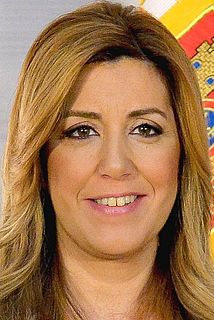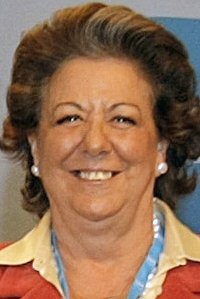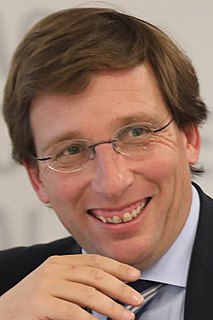
The politics of Bolivia takes place in a framework of a presidential representative democratic republic, whereby the president is head of state, head of government and head of a diverse multi-party system. Executive power is exercised by the government. Legislative power is vested in both the government and the two chambers of parliament. Both the Judiciary and the electoral branch are independent of the executive and the legislature. After the 2014 election, 53.1% of the seats in national parliament were held by women, a higher proportion of women than that of the population.

Elections in Bolivia gives information on elections and election results in Bolivia.

The Plurinational Legislative Assembly is the national legislature of Bolivia, placed in La Paz, the country's seat of government.

The Media Luna or Media Luna Ampliada refers to a group of four departments – Santa Cruz, Beni, Pando, and Tarija – in Bolivia which became the geographic area of opposition to the national government led by Evo Morales and the Movement for Socialism (MAS).
The Social Alliance is a Bolivian political party founded on 9 October 2005. It was granted juridical personhood by the National Electoral Court on 22 December 2006. The party grew out of the successful 2004 campaign of leader René Joaquino Cabrera for mayor of Potosí.

The 2010 Bolivian regional elections were held on 4 April 2010. Departmental and municipal authorities were elected by an electorate of approximately 5 million people. Among the officials elected are:
The Movement for Sovereignty is a leftist, indigenist Bolivian political party founded by dissidents of the Movement for Socialism (MAS-IPSP). Its leader, and fourth-place candidate for Governor of La Paz department in the 2010 regional election is Lino Villca. Other MAS-IPSP activists involved in founding the MPS include Óscar Chirinos, Miguel Machaca, and Rufo Calle. The party's colors are blue, white, and yellow.
Óscar Zamora Medinaceli was a Bolivian politician and lawyer. A communist student activist in his youth and leader of a failed Maoist insurgency in the 1970s, Zamora Medinaceli went on to become a senator, minister, mayor, ambassador and prefect.
Municipal elections were held in Bolivia, on December 5, 1999, in all 311 municipalities across the country. The elections marked a milestone in the continuous deterioration of the political influence of the traditional parties. In 23 municipalities the mayors were elected through direct popular vote, in other municipalities the mayors were elected by the respective municipal council.
The first Bolivian judicial election was held on 16 October 2011. The national vote was held to elect magistrates to serve on the Supreme Tribunal of Justice, the Plurinational Constitutional Tribunal, the Agro-environmental Tribunal and members of the Council of the Judiciary. It was originally scheduled to be held on 5 December 2010, but officials of the National Electoral Court and of the MAS majority in the Plurinational Legislative Assembly delayed it. The vote will be the first time that a Latin American country directly elects its highest judicial officials.
The 2011 Bolivian special municipal elections were held on 18 December 2011. These elections cover three of five municipalities currently without elected mayors in Bolivia: Sucre, Quillacollo, and Pazña. Elections for the Mayor of Punata will be held 29 April or 6 May 2012. Newly elected mayors will receive their credentials from the Supreme Electoral Tribunal on 27 January 2011, after which they may be sworn in.
The 2013 Beni special gubernatorial election was held on 20 January 2013. The elections were held to replace the interim governor of Beni Department with an elected executive who will serve until 2015. Numerous observers described the election as an important test of political strength in eastern Bolivia: a MAS victory would signal the retreat of the Media Luna right-wing alliance to Santa Cruz department alone; while a Beni First victory would dash MAS' political ambitions in the department.
Beni First is a regional, right-leaning political party in Beni Department. The party won the 4 April 2010 regional election, the only one it has ever contested, electing both Ernesto Suárez Sattori as governor and a plurality of 11 members of the Departmental Legislative Assembly, in which it became the largest single party. It holds the mayor's office in eight municipalities.

The 2013 Bolivian special municipal elections were held on 13 January 2013 in the municipalities of Punata and Bermejo (in Tarija Department. Newly elected mayors will receive their credentials from the Supreme Electoral Tribunal, after which they may be sworn in.

The 2015 Madrilenian regional election was held on Sunday, 24 May 2015, to elect the 10th Assembly of the Community of Madrid. All 129 seats in the Assembly were up for election. The election was held simultaneously with regional elections in twelve other autonomous communities and local elections all throughout Spain.

The 2015 Andalusian regional election was held on Sunday, 22 March 2015, to elect the 10th Parliament of the Autonomous Community of Andalusia. All 109 seats in the Parliament were up for election.

The Bolivian general election, 2014 was Bolivia's second to take place under the country's 2009 constitution, and the first supervised by the Plurinational Electoral Organ, a newly created fourth branch of government. Incumbent President Evo Morales was re-elected for a third term.

The 2015 Valencia City Council election, also the 2015 Valencia municipal election, was held on Sunday, 24 May 2015, to elect the 10th City Council of the municipality of Valencia. All 33 seats in the City Council were up for election. The election was held simultaneously with regional elections in thirteen autonomous communities and local elections all throughout Spain.

The 2019 Madrid City Council election, also the 2019 Madrid municipal election, is scheduled to be held on Sunday, 26 May 2019, to elect the 11th City Council of the municipality of Madrid. All 57 seats in the City Council will be up for election. The election will be held simultaneously with regional elections in at least seven autonomous communities and local elections all throughout Spain, as well as the 2019 European Parliament election.











